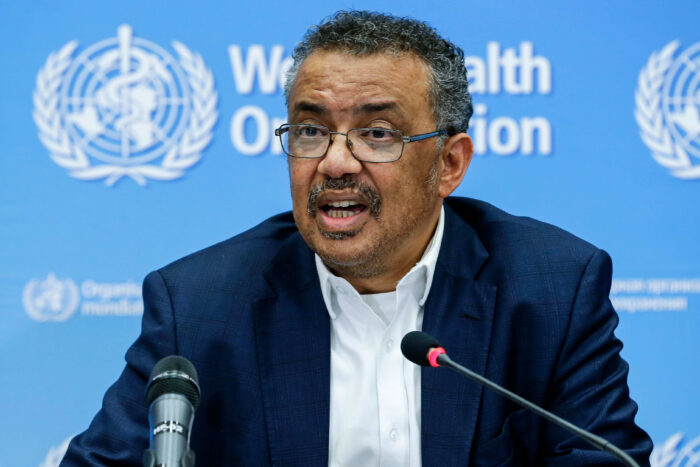The World Health Organization stated Wednesday that the spread of the new coronavirus outside of China is of “grave concern,” which has prompted it to reconsider an emergency meeting this week to determine whether the coronavirus outbreak has become a global emergency.

The new virus, first seen in the Chinese city of Wuhan, has now passed on to a handful of people outside China, with human-to-human transmission also reported, Dr Mile Ryan, executive director of WHO’s health emergencies program, told a news conference at Geneva headquarters Wednesday.
“The developments in terms of the evolution of the spread and further expansion of transmission are of grave concern and have urged countries into action,” Ryan said and added that he had just returned from China.
“What we got at this stage is that this is still clearly a very active outbreak, and details are being updated and varying by the hour,” Ryan said.
Up to currently, the coronavirus epidemic has killed 132 people in China, with more than 6,150 infected across over a dozen countries worldwide.
The WHO’s chief director said there are 71 cases in around 15 other countries outside China. However, at two emergency meetings last week, he declined to affirm the coronavirus as a global health emergency.
First reported in Wuhan on December 31, the coronavirus mushroomed to 6,061 cases in mainland China as of Wednesday morning. The virus has surpassed the total number of SARS cases in China during the 2003 epidemic.
According to the World Health Organization, 5,327 SARS cases in China and about 8,000 worldwide were identified between November 1, 2002, and July 31, 2003.
Last week, Ryan told reporters about the WHO’s criteria used to determine whether a disease is an international health emergency, saying that it depends on if a disease spreads in new parts of the world, “and that’s a nuanced and crucial distinction to make.”
Dr Mile Ryan further told the reporters that the other key criteria are to assess whether an outbreak has already interfered with or will likely interfere with travel and trade.
Ryan said the goal of WHO’s committee is to contain an epidemic without unnecessarily disturbing economic activity by declaring a global health crisis.
Some German health officials said on Tuesday that a 33-year-old man there contracted the virus from a colleague whom he visited at a workplace in Shanghai, pointing to what appears to be one of the first cases of human-to-human transmission outside China.
Tedros Adhanom Ghebreyesus, the Director-General of WHO, described the “continued rise in cases and the confirmation of person-to-person transmission outside of China as definitely most disturbing.” According to Tedros, illness from the new coronavirus produces a range of symptoms that could eventually make patients extremely ill with pneumonia and respiratory failure.
“Though the numbers outside China are relatively low, they hold the potential for a much greater outbreak,” Tedros warned.
The WHO Director-General also said late during the conference that he recently met with Chinese President Xi Jinping, China’s minister of foreign affairs, Wang Yi, and China’s National Health Commission minister, Ma Xiaowei, on Tuesday. During the meeting, the Chinese officials and I discussed containment measures and sharing information on the virus, Tedros said.
“I was really encouraged and impressed by the President’s knowledge of the outbreak and his self-involvement in the response,” Tedros told reporters.
World Health Organization officials explained that they view the current coronavirus epidemic on four different fronts:
- The public health response in the city of Wuhan
- The response in other Chinese provinces
- The 15 other countries with confirmed cases
- Preventative initiatives worldwide
“We’re moving forward on sharing information, guidelines and tools,” the WHO Director-General said.

